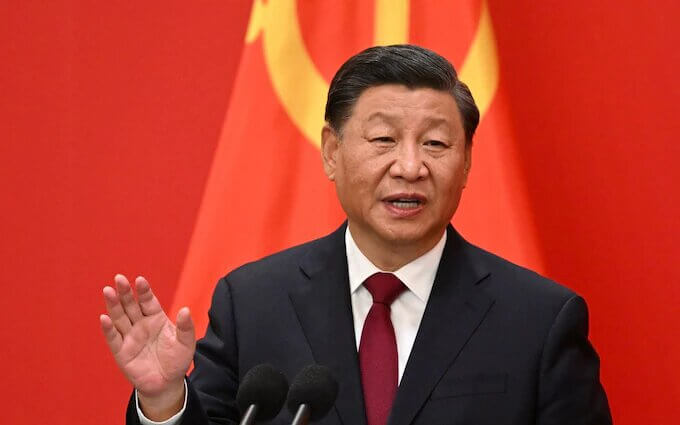In a report released on Thursday, the US State Department issued a strong warning, accusing the Chinese government of increasing attempts to build a global information ecosystem that favours its propaganda while also facilitating censorship and the spread of disinformation.
According to the Global Engagement Center (GEC), which combats foreign propaganda and misinformation, China has the “potential to reshape the global information environment.”
China spending billions to spread disinformation: US gov't reporthttps://t.co/NumxpuYkAG
— ABS-CBN News (@ABSCBNNews) September 29, 2023
US Report on China’s Disinformation Campaign
Based on the report, the People’s Republic of China (PRC)’s information manipulation efforts consist of five primary elements: leveraging propaganda and censorship; promoting digital authoritarianism; leveraging international organisations and bilateral partnerships; combining co-optation and pressure; and exercising control over Chinese-language media.
Chinese President Xi Jinping pressed the PRC’s official media in 2021 to increase propaganda and create “precise communication methods” to influence international audiences globally.
Leveraging Propaganda and Censorship
Reports suggest that China not only promotes its propaganda but also exports surveillance tools to regulate information and people online. Although many approaches described are not new, the GEC report warns that they might “lead nations to make decisions that subordinate their economic and security interests to Beijing.”
The report alleges that PRC suppresses crucial data that contradicts its desired narratives on matters such as Taiwan, its human rights practises, the South China Sea, its domestic economy, and international economic engagement.
More broadly, the PRC aims to build and sustain a global incentive system that encourages other governments, intellectuals, media, and civil society to accept its preferred narratives and refrain from criticising its behaviour.
The report notes that Beijing has acquired shares in international media through public and non-public channels, as well as sponsored internet influencers.
It further indicates that the PRC has targeted platforms, such as digital television services in Africa and satellite networks, for worldwide information dissemination.
Promoting Digital Authoritarianism
The report states that China mainly focuses on promoting Digital Authoritarianism, which includes using digital infrastructure to suppress free expression, restrict independent news, spread disinformation, and deny other human rights.
By 2019, PRC information restrictions had expanded to 102 nations. In 11 countries, the most widespread use of PRC information control methods resulted in imitating or directly replicating PRC information control laws and procedures.
As per the report, foreign countries have used Huawei technology worth hundreds of millions of dollars with Beijing’s cooperation to facilitate police activity and even capture electronic communications and cellular location data of domestic political opposition members.
For instance, TikTok’s owner, ByteDance, seeks to prevent prospective opponents of Beijing, perhaps including individuals from outside the PRC, from using its platforms.
Leveraging Bilateral Partnerships
China, which has close ties with Russia, has also used its information apparatus to support the Kremlin’s claims about the Ukraine War, the report claims.
China has backed up Russia’s assertions that Kyiv has been operating secret biological weapons facilities, reiterating Moscow’s claims that NATO expansion sparked the war.
The report suggests that Russia responded by boosting Chinese propaganda connected to Beijing’s claims to the democratic, self-governing island of Taiwan and PRC’s other interests.
The Chinese government reached an arrangement with a local newspaper in an East African country, “and the newspaper agreed that the [PRC-] paid articles would not have a direct connection to the PRC.”
Reports suggest that the Chinese efforts are overt and covert, with a special emphasis on Asia, Africa, and Latin America, as stated in the report, which provides various examples and effects.
“Between 1997 and 2022, Beijing initiated cyberattacks against, and threatened the families of, more than 5,500 overseas Uyghurs,” as stated in the GEC report, citing research by the Woodrow Wilson Centre.
Control Over Chinese-Language Media
China Central Television (CCTV), a state-run media outlet, distributes free video footage and television scripts to 1,700 international news and media organisations. Often, information produced by the PRC’s official media is repackaged for local channels without any marking that would identify it as originating from a foreign government.
By 2021, almost 100 influencers had spread official PRC propaganda in at least two dozen languages across several social media platforms to a reach of over 11 million followers from various nations.
Global Impact
The report indicates that the PRC’s global information manipulation threatens the integrity of the global information space, and it is not just an issue of public diplomacy.
If left unchecked, Beijing’s efforts might lead to a future in which PRC-exported technology, co-opted local governments, and fear of direct retaliation from Beijing result in a sharp decrease in global freedom of speech.
Consequently, China would tremendously impact the print and digital information consumed by people in developing countries.
As per the report, in the future, the information available to the public, media, civil society, academics, and governments in dealings with the PRC may be warped by propaganda and disinformation and limited by censorship. Such information would directly challenge those states seeking to base their ties with the PRC on fact-based assessments of their sovereign interests.

